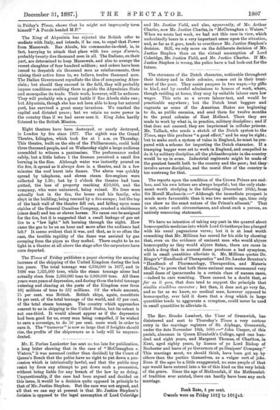Eight theatres have been destroyed, or nearly destroyed, in London
by fire since 1877. The eighth was the Grand Theatre, Islington, which took fire at 1 a.m. on Thursday. This theatre, built on the site of the Philharmonic, could hold three thousand people, and on Wednesday night a large audience assembled to witness a pantomime. The performance ended safely, but a little before 1 the fireman perceived a small fire burning in the flies. Although water was instantly poured on the fire, it spread as it always does in a theatre, and in a few minutes the roof burst into flames. The alarm was quickly spread by telephone, and eleven steam fire-engines were collected by 1.30 ; but by 2 o'clock the theatre had been gutted, the loss of property reaching £20,000, and the company, who were uninsured, being ruined. No lives were actually lost in the fire, the lessee and his family, who slept in the building, being rescued by a fire-escape; but the top of the back wall of the theatre fell out, and falling upon some stables of the General Omnibus Company, crushed a stableman (since dead) and ten or eleven horses. No cause can be assigned for the fire, but it is suggested that a small leakage of gas set fire to a "low light" left burning through the night. How came the gas to be on-an hour and more after the audience had left P It seems evident that it was, and that, as is so often the case, the terrible rapidity of the flame was assisted by gas escaping from the pipes as they melted. There ought to be no light in a theatre at all above the stage after the carpenters have once departed.






































 Previous page
Previous page